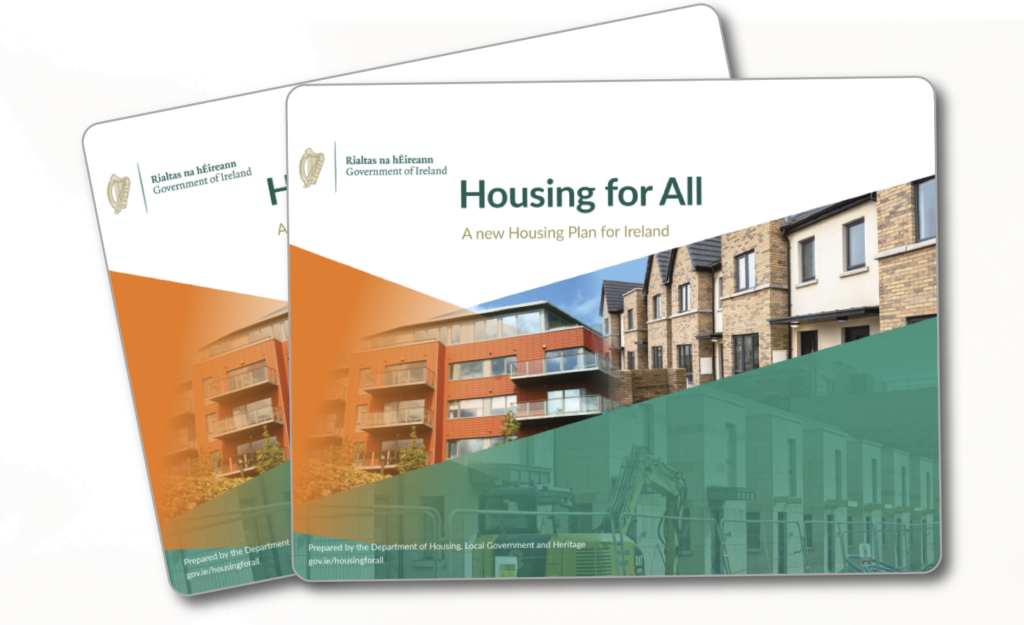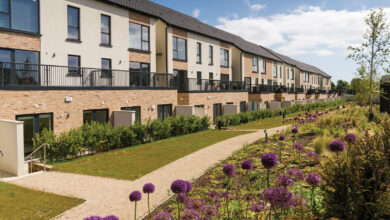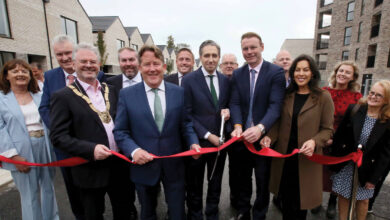Housing for All: A new Housing Plan for Ireland

Right now, Ireland’s housing system is not meeting the needs of enough of our people. My colleagues in Government and I are keenly aware of this. Minister for Housing Darragh O’Brien TD writes.
As we finally – and thankfully – come out the other side of Covid-19, the Government has stated loudly and clearly that the housing crisis will be given the same attention and focus as the pandemic. We say this because we know that the impact of the housing crisis is felt in every family across our country. Be it the hard-pressed tenants stuck in a rent trap or those at the sharpest edge of the crisis, who will spend tonight sleeping in emergency accommodation or worse, sleeping rough on one of our city streets.
Criticism of the Plan has, predictably, ranged from it being too ambitious to it not being ambitious enough. It is ambitious. It needs to be. It sets out, over four pathways, a series of bold actions that rise to the challenges we are facing, backed up by an unprecedented financial commitment in excess of €4 billion per annum.
Over 300,000 new homes will be built by the end of 2030, including a projected 90,000 social homes, 36,000 affordable purchase homes and 18,000 cost rental homes. It’s the largest State-led building programme in our history. This eclipses the heydays of the 1940s and 1950s.

“At the heart of the Plan is massively expanding the role of the State into providing affordable homes for purchase and rent while building historic levels of new social housing.”
At the heart of the Plan is massively expanding the role of the State into providing affordable homes for purchase and rent while building historic levels of new social housing. A new First Home Shared Equity Scheme will see the State step in to bridge the gap between the finance a person has and the price of a new home.
This scheme will help those currently paying high rents to pay down a mortgage on their own home instead. The local authority-led Affordable Purchase Scheme will see affordable homes delivered at an average price of €250,000 while the newly enhanced Local Authority Home Loan Scheme will see a greater number of people eligible for a State-backed mortgage. The income eligibility limit for a single applicant will increase from €50,000 to €65,000 in certain areas, while the interest rate will be decreased for new borrowers.
Cost rental is a very exciting aspect of Housing for All which will, for the first time ever in the State, deliver long-term security of tenure at affordable and predictable prices. Over the course of the Plan, 18,000 cost rental homes will be delivered across the country at rates a minimum 25 per cent below open market value.
The eligible tenants, people who are above the social housing income limits, and who wish to rent or are unable to buy their own home, will be charged rents that cover the cost of developing, financing, managing and maintaining the homes only.
Already tenants are in situ in their cost rental homes in Balbriggan in north County Dublin where some tenants are availing of rents which are approximately 50 per cent below the market rate in the area. As well as the significant ramping up of cost rental homes, the Government will introduce measures which include indefinite tenures and minimum building energy ratings in private rental accommodation.
We will introduce new short-term letting regulations through a Fáilte Ireland registration system meaning more rental properties in the long-term rental market. We have already restricted any upfront payment upon the commencement of a tenancy to a total value that does not exceed two months’ rent i.e., a deposit and one month rent in advance.
Crucially, we have extended rent pressure zones (RPZs) and linked rents to general inflation putting an end to the annual 4 per cent rent increases which we were seeing. At the time of introducing this legislation, which we did so expeditiously, I acknowledged inflation was rising and said that I would keep the need for an overall cap under review. As part of rent reforms due to be brought before the Oireachtas this session, we will introduce a cap so that rents in RPZs will only go up, if necessary, in line with general inflation to a maximum cap which will be determined in conjunction with the Attorney General and the advice from my department.
“This Plan will ensure that we achieve a more sustainable housing system with a planning system that is fit for purpose and that will create long-term vibrant communities with the necessary supporting infrastructure.”
The commitment given by government for the eradication of homelessness by 2030 was made with careful and thoughtful consideration. Protecting the most vulnerable has to be our priority. The rapid and joined-up response by our homeless services – and their extraordinary commitment throughout the pandemic – resulted in an unprecedented upscaling of services to keep people safe. The strong collaboration that has developed must continue and I will do everything I can to ensure that vital health and mental health supports are provided in tandem with housing for our most vulnerable.
In this respect, the commitment given under Housing for All for an additional 1,200 Housing First tenancies over the next five years is key. Housing First provides homeless people with high support needs with housing and the essential wraparound supports required to maintain a tenancy. The tenancy sustainment rate is approximately 85 per cent under Housing First and this means we can help those rough sleeping or experiencing long-term homelessness to successfully exit into secure safe tenancies – something we must continually strive towards.
Having homes vacant in the middle of a housing crisis is unacceptable. Whether they are vacant local authority homes, known as voids, or derelict eyesores in our towns and villages it’s not something we want to see. Through Housing for All, the Government has set out a number of steps it will take to alleviate this problem and to bring life back into our cities, towns and villages.
Last year, 3,607 vacant social homes were brought back into productive use with a further 3,000 targeted for refurbishment and reletting this year. Changes have already been made in respect of the Fair Deal scheme to ensure that there are no disincentives to a person selling the principal private residence and further changes will be made to exempt rental income from being calculated as part of an applicant’s income.
This will unlock the potential for thousands of homes to be sold or rent without financial penalties, should a person wish to do that. The new Croí Cónaithe (Towns) Fund which will be established, will be a gamechanger in terms of servicing sites and refurbishing vacant properties in regional towns and villages for prospective homeowners.
We all look around our towns and see vacant or run-down sites which we know would be perfect for housing and close to all essential services. This fund will unlock that potential while also providing financial assistance to those wishing to purchase a vacant property in a town or village to refurbish so that they can live in it.
A nationwide, local authority-led, Compulsory Purchase Order (CPO) Scheme to purchase vacant homes will be rolled out and this is something I want to see councils get involved in. At least 2,500 vacant properties are to be targeted nationwide.
On the other side of this issue is the need for penalties for those who wilfully leave homes and sites vacant. A new vacant site tax will be introduced to replace the vacant site levy which we know has not worked the way it was intended. Information will be gathered through the Local Property Tax returns with a view to introducing a vacant property tax. We need this information because as we all know homes can be left vacant for any number of reasons and this way the tax will be targeted at those who wilfully leave a home idle. These measures combined will make a much-needed impact in tackling vacancy.
Housing for All is not just about delivering the necessary homes for private, social and affordable housing. It is also about setting out a pathway to economic, societal and environmental sustainability in the delivery of housing. Our measures relating to the construction sector, including costs, will help make the delivery of housing more economically sustainable in the long-term. This Plan will ensure that we achieve a more sustainable housing system with a planning system that is fit for purpose and that will create long-term vibrant communities with the necessary supporting infrastructure.
The implementation of this Plan is now of the utmost importance. Oversight will be provided by the Cabinet Committee on Housing. Actions will be continually monitored and updated annually to account for the latest analysis, performance against our targets, and any new or corrective actions that may be necessary in order to stay on track towards our targets. By working together to implement this Plan, the Government will make every effort to accelerate the delivery of Housing for All and work towards a long-term sustainable housing system for this and future generations.
I am determined this Plan will work, we have the solutions, ability, drive and determination to make a real impact, and importantly we have a plan that is fully financed.





